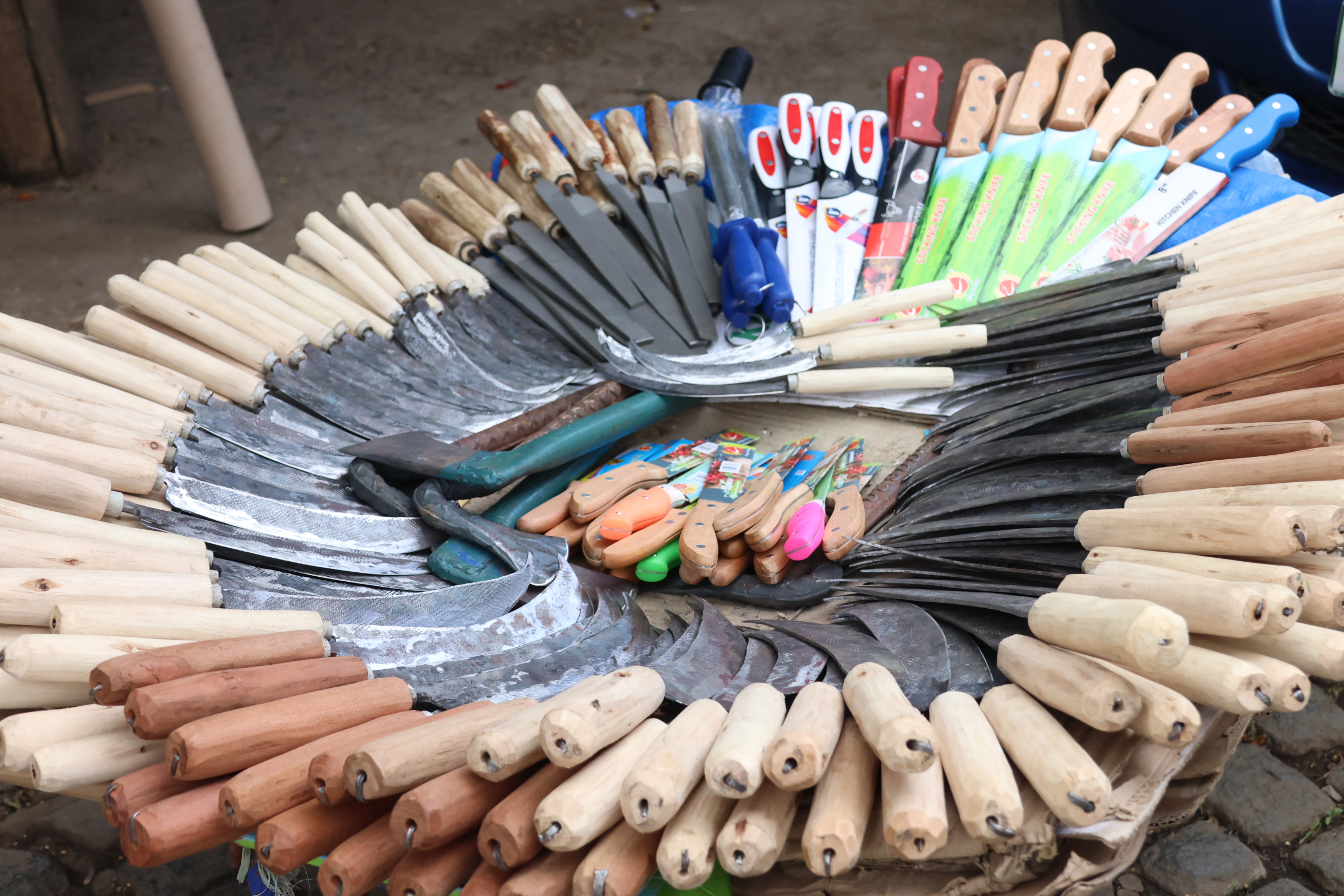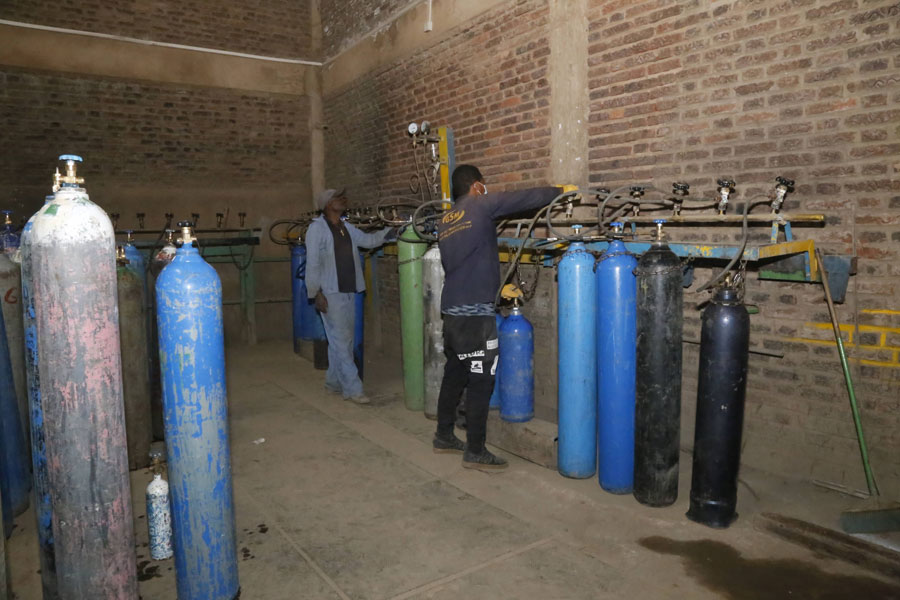
Featured | Sep 29,2024
The gloomy weather on the last Friday of the year barely bothered Alemshet Mulgeta, who had been frantically moving from one vendor to the next for three hours in search of a "fairly priced" chicken.
The limited 1,000 Br budget forced her to haggle with nearly every seller who was capping prices around 1,200 Br. The 40-year-old mother of two is struggling to manage buying butter, chicken, spices and an ox divided amongst 10 of her neighbours with her 20,000 Br budget despite attempting to beat the holiday rush by coming four days earlier.
"It's ripping through my wallet," she told Fortune.
The Shola Gebeya around the Megenagna area is unmistakable for its pungent odour, the cackling of chickens and passionate vendors bargaining to the very last penny.
Yitagesu Alemu, a poultry trader in the area, calls out to buyers by pointing to his 70 chickens priced between 550 Br for a fowl and 1,200 Br for a red feathered full-grown chicken from Wolaita zone.
Despite most shoppers sizing up the chickens and leaving upon learning of the price, the vigorous salesman managed to sell 30 chickens in the week. Eggs are fetching 16 Br in the market, a sharp incline from the prior year of around 10 Br.
"It doesn't feel quite like a holiday market," Yitagesu told Fortune.
He said they will be forced to sell at a loss if the holiday season passes them by, pointing to the lull in demand caused by the general inflation in the economy.
"Buyers are fleeing," he bemoans.
Spice vendors seem to be faring better in this year's holiday markets, with busy vendors and impassioned buyers roaming the open markets of Shola.
A Kilo of butter (Lega Qibe) has shot up by 100 Br in the past two weeks, fetching 900 Br for varieties brought over from Wollega and Gojam Zones.
Solomon Addis, a spice vendor, attributes the price increments to the complication of logistics routes in the Amhara Regional State due to the ongoing conflict.
From cottage cheese and cardamom to honey, everything has climbed up the price ladder.
A kilogram of cardamom is selling for 380 Br an uptake of 100 Br in two weeks, while honey is fetching for 600 Br.
"It depends on the availability of supply," the busy trader told Fortune. Red pepper, the source of flavour for any well-made chicken stew (Do'ro Wet) is selling for 200 Br a kilo, while black cumin costs around 250 Br
The price hikes are forcing holiday shoppers to make adjustments to their holiday culinary experience, with some opting to leave out several key parts of the holiday menu.
"We're not buying chicken this year," said Tigist Alan, a 24-year-old recent entrant to the capital from Wolaita Zone. Together with her roommate, they have left the stew out of their holiday menu, instead buying a kilo of beef, two kilos of pepper and some other spices with their 2,000 Br budget.
The holiday lull has caught up with the brimming cattle market around the Qera area known for its selection of sheep, goats and bovine.
Over thousands of sheep are stalked by tired vendors ready to prowl at the sight of any potential buyer. The few customers feel out the sheep sprawled out in the open field, as tent covers were prohibited in the capital this year, fleeing at the mention of prices.
Wegeze Desalegn recalled selling nearly 200 sheep last year. This year, the sheep vendor is frustrated with the market lull despite slashing his supply by half in anticipation of the slow market.
"I don't want to incur a painful loss," said the vendor who has seen the price of sheep fall by half.
Sheep prices have declined ranging from 8,000 Br to 15,000 Br since the last holiday season. But it has not helped the market with urbanites counting pennies on their shoestring budgets.
The Ministry of Trade & Regional Integration's attempt to curb the holiday inflation through State Minister Teshale Belhu's project of filling in the gaps since last week seems to have bore little fruit.
Efforts by the Ministry included formalising 170 Sunday markets, while its attempt at creating direct linkages to farmers fared better as prices for a kilo of onions stand at 60 Br while the price for tomatoes stands at 25 Br a kilo.
Bovines being whipped with 50 Br batons roam around the cattle market while vendors chase after them in a bid to contain the chaos in the expansive Qera fields capable of accommodating up to 20,000 cattle.
Vendors frustrated with the absence of customers such as Mohammed Abamecha ceaselessly beat the cattle, seemingly releasing some form of anger.
"The cold weather makes them erratic," he justified.
Wet dirt, mud and faeces have covered the cattle huddled in the area, which used to have a covering tent before the City Administration removed it in a bid to "beautify" the urban landscape.
The 40-year-old cattle vendor said the unappealing appearance of the cattle pushes away customers.
Mohammed indicated that the combination of transportation costs, taxes levied per a single slaughter and the overall inflation have derailed sales this year. He is disheartened by the combination of new taxes per single slaughter, transportation costs and a dreary holiday market.
The vendor points to the vast expanse of muddy fields which lack proper sanitation. While Mohammed has brought in 12 cattle to sell he does not see much hope in the market.
"It's a loose loose business," he told Fortune.
Oxen are being sold at prices ranging between 38,000 Br and 200,000 Br across the 13 Woredas in the Nifas Silk District, with most coming from Harar, Jimma and Welega.
Mohammed disclosed that conflict in the Amhara Regional State had held a few thousand oxen from being transported to the site.
"No Bovines made it to the site from there," he said.
Drivers also acknowledge the rise in transportation costs with Tamrat Wondmu, who commutes back and from the Southern Regional State, revealing that prices have increased twofold to 45,000 Br.
"We transfer the fuel costs down to the vendors," he told Fortune.
The state-owned slaughterhouse, Addis Abeba Abbattiors Enterprise, commences pre and post-examinations on cattle before slaughtering and distributing to butcher shops and institutional meat shops for the past 65 years.
Ataklti Gebre Michael, communication director of the Enterprise, says illegal butchering has been ballooning around the city's butcher shops and restaurants, subjecting consumers to cattle-bred diseases.
"They are selfishly valuing their profit over consumers' health," he told Fortune.
He indicated that there are nearly 100 diseases transmitted by meat. He said some butchers are trying to avoid coming to Enterprise lest they have to deal with tax obligations that require a 35 levy on each slaughter.
There are 3,000 butchers in Addis Abeba.
Atakilti disclosed that they are trying to create awareness among consumers in a bid to control the hard-pressing issue. He said that the economic, environmental, and health crisis passed on due to the impeding issue is being realised slowly among different stakeholders.
According to Atakilti, the effect is being downplayed among stakeholders despite 114 sites where illegal slaughtering takes place being identified.
"Nobody seems to be doing anything about it," he said.
For the New Year holiday, the Enterprise is examining and slaughtering over 5,000 cattle, with 3,000 oxen and 2,000 goats coming its way. Private enterprises have their share of the holiday basket of goods, with well-off urbanites choosing them for their quiet and calm ambience.
The Fresh Corner Supermarket around Bambis, one of the 13 branches of the chain store across the city, provides holiday shopping options to its customers at an affordable price.
A kilo of packed local chicken meat is sold for 599 Br while a kilo of processed one is sold for 690 Br, with butter going for 1,500 Br a kilo, and eggs for 12.50 Br, 1.5 kilos of honey for 839 Br.
The holiday spirit Tej is sold for 1,048 Br per three litres, a 1.6 kilo of butter fetches up to 1,500 Br and a kilo of cottage cheese for 600 Br.
"We expect double the number of daily customers," said Menda Admase, supervisor of the Bambis branch, which sees an average of 300 buyers a day.
The Addis Abeba City Administration has been working in tandem with the Ministry to curb the holiday spike in prices over the last month.
It has apportioned the 1.4 billion Br revolving fund to cooperative agencies that have 11 unions under their umbrella, extending to 155 consumer associations city-wide. The effort yielded resulted in the distribution of over 55,800qtl of teff, 1.22 million litres of palm oil, 55,000 sheep, 6,600 bovines, 128,000 chickens, and three million eggs.
Birhan Consumer Association, founded in Kolfe Keranio District, has been distributing holiday commodities to over 40,000 residents in Woreda 08. It has managed to distribute 34,000 litres of edible oil at 547.7 Br, 61qtl of onion at 58 Br a kilo and 550 Br for a kilo of beef alongside 90qtl of maize flour and 110qtl of teff.
Gebretinsae Kassahun who manages the Association said they had to go and purchase teff and maize flour on their own by connecting with traders as the unions ran out.
"We really had struggled with the price and keep customers' needs at bay," he told Fortune.
He indicated that prices had spiked up where a quintal of teff estimated to be 9,000 Br surged to 9,800 Br, and maize, which should have been distributed at 7,800 Br was sold for 8,500 Br.
The Manager revealed that they retracted plans to distribute cottage cheese and butter after consumers showed a lack of interest last year.
The Capital's Trade Bureau has distributed seven bazaar sites and 172 Sunday markets all across the city's landscape to tether with inflation, political instability, and illicit traders. The Bureau had dispatched a regulatory force to clump down over 20 agencies selling holiday commodities without a license.
According to Sewnet Ayele, the communication director at the Bureau, strategies are underway to replace older trading sites with new ones while renovating the promising ones.
"We're conducting surveys to identify which ones to renovate," he told Fortune.
Economists suggest an overhaul to consumption patterns, shifting the balance of power during negotiations to buyers rather than vendors.
"There needs to be reform in consumer culture," said Shiferaw Shitahun, a political economist. He indicated that the competition among retailers will drive down prices and improve the quality of goods and services.
"Consumers will have the power on what is produced and how it is produced", he said.
As Holidays prompt the movement of endless cash among consumers and retailers, Shiferaw also said that the Central Bank should play a part in penning fiscal policies around holiday markets to control public spending, cash flows and money supply in the market.
PUBLISHED ON
Sep 09,2023 [ VOL
24 , NO
1219]

Featured | Sep 29,2024

Radar | Nov 20,2023

In-Picture | Apr 27,2025

Featured | Nov 23,2019

Commentaries | Apr 06,2024

Fortune News | Jul 18,2020

My Opinion | Nov 13,2021

Viewpoints | Oct 21,2023

Agenda | May 15,2021

Radar | Aug 28,2021

Dec 22 , 2024 . By TIZITA SHEWAFERAW
Charged with transforming colossal state-owned enterprises into modern and competitiv...

Aug 18 , 2024 . By AKSAH ITALO
Although predictable Yonas Zerihun's job in the ride-hailing service is not immune to...

Jul 28 , 2024 . By TIZITA SHEWAFERAW
Unhabitual, perhaps too many, Samuel Gebreyohannes, 38, used to occasionally enjoy a couple of beers at breakfast. However, he recently swit...

Jul 13 , 2024 . By AKSAH ITALO
Investors who rely on tractors, trucks, and field vehicles for commuting, transporting commodities, and f...

Oct 25 , 2025
The regulatory machinery is on overdrive. In only two years, no fewer than 35 new pro...

Oct 18 , 2025
The political establishment, notably the ruling party and its top brass, has become p...

Oct 11 , 2025
Ladislas Farago, a roving Associated Press (AP) correspondent, arrived in Ethiopia in...

Oct 4 , 2025
Eyob Tekalegn (PhD) had been in the Governor's chair for only weeks when, on Septembe...